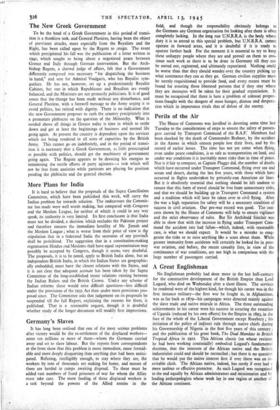Germany's Slaves
It has long been realised that one of the most serious problems after victory would be the re-settlement of the displaced workers— some ten millions or more of them—whom the Germans carried away and set to slave labour. But the reports from correspondents at the front show that this problem is more immediate, more formid- able and more deeply disquieting than anything that had been antici- pated. Refusing, intelligibly enough, to stay where they are, the workers by tens of thousands art making for home, and masses of them are herded in camps awaiting disposal. To these must be added vast numbers of freed prisoners of war for whom the Allies must take care. The mere feeding of these displaced workers is a task beyond the powers of the Allied armies in the field, and though the responsibility obviously belongs to the Germans any German organisation for looking after them is often completely lacking. In the long run U.N.R.R.A. is the body whose duty it is to attend to this special problem, but U.N.R.R.A. cannot operate in forward areas, and it is doubtful if it is ready to operate farther back For the moment it is essential to try to keep these unhappy people where they are and prevail on them to con- tinue such work as there is to be done in Germany till they can be sorted out, registered, and ultimately repatriated. Nothing could be worse than that they should wander over the country picking up what sustenance they can as they go. German civilian supplies must be sternly requisitioned to provide food, and every means must be found for assuring these liberated persons that if they stay where they are measures will be taken for their gradual repatriation. It must be recognised that there is here a problem of colossal propor- tions fraught with the dangers of mass hunger, disease and despera- tion which in importance rivals that of defeat of the enemy.


























 Previous page
Previous page